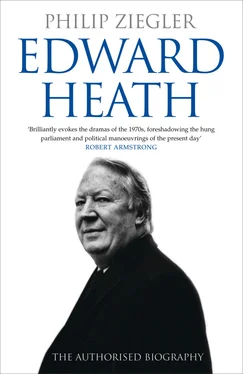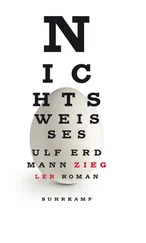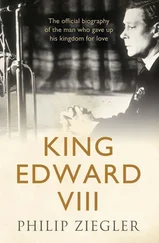But when it was a case of working on members opposed to military intervention – in particular the eleven MPs, among whom Keith Joseph and Bob Boothby were the most prominent, who signed a letter demanding that British troops should be placed under the command of the United Nations – his approach was notably dulcet. It was also on the whole successful. Just before a crucial vote on 8 November he was seen exhorting two young MPs, Peter Kirk and David Price, who were known to be planning to abstain. He warned them that, if they did so, they might destroy the Government and, incidentally, their own futures. His arguments prevailed. But he was less successful with Nigel Nicolson. ‘I still believe it cannot be a bad thing for the party’, Nicolson told Heath, ‘that there should be at least one Conservative backbencher who is prepared to state he agrees with the very many eminent Conservatives outside this House who have expressed their distress at the Government’s action.’ Eventually Nicolson said that he would support the Government if the Chief Whip would assure him ‘that the purpose of our invasion was “to separate the combatants”, as the Prime Minister claimed and not to regain control of the Canal by a subterfuge. He held my gaze steadily and said nothing. I thanked him for his honesty, told him that I would abstain, and left the room.’ 31When Anthony Nutting, a junior minister at the Foreign Office, resigned in protest at the Government’s action, a campaign to discredit him was launched, hinting that there were malign influences at work and that he had personal reasons for his behaviour, unconnected with the merits of the case. As often as not this sort of campaign would have had its origins in the Whips’ Office. It is hard to prove a negative but it would have been wholly out of character if Heath had lent his authority to such an operation. Again and again in the course of his career he refused to make use of damaging gossip, even though he believed it to be true. The sort of disinformation used to blacken Nutting’s reputation would have repelled him. If such a campaign was in fact mounted it was more probably the work of somebody in Number 10. 32
But both wings of the party were in revolt. One group objected to intervention; the other, the ‘Suez Group’, was outraged when the government succumbed to overwhelming American pressure and agreed to withdraw from Egypt. The latter were more numerous, more clamorous and, in Heath’s eyes, less worthy of sympathy. He treated them altogether more roughly. When Patrick Maitland said that he could not in conscience support the party, the Chief Whip exploded: ‘I’m fed up with your bloody consciences. I’m going to get on to your constituency.’ According to Maitland, he did so and was rebuffed. Maitland went public on the ‘extraordinary and unexampled pressures – some of them altogether underhand’, to which he and his fellow rebels had been subjected. That Labour hatchet-man, George Wigg, tried to raise the matter as a breach of parliamentary privilege but the Speaker ruled that ‘the work of the Whips had never been thought to be a matter of privilege’. There were very few occasions during his term of office as Chief Whip that Heath could legitimately be accused of going too far, of straying beyond the boundaries of propriety. That it was the Suez Group who provoked such conduct perhaps reflects his uneasy conscience at having pressed the opponents of intervention to vote for a course of action which he himself felt to be morally wrong and politically inexpedient. He could not publicly condone their behaviour if they rejected his pleas but he could express his true feelings by the added vigour with which he denounced rebels from the other wing. He turned to John Biggs-Davidson, a rabid member of the Suez Group, and told him: ‘You were a Communist before the war and now you are nothing but a bloody Fascist.’ Some years later he was asked if he had really used such words. Heath reflected for a movement. ‘I didn’t say “nothing but”,’ he concluded. 33
Whatever his personal views, he could not disguise the fact that a substantial element in the party, both inside and outside parliament, was deeply dissatisfied with the Government’s conduct of the Suez crisis. On the whole he handled such protests with tact and moderation. When Lawrence Turner abstained on a critical vote on the grounds that ‘the present Government has betrayed basic Conservative principles and been disloyal to everything for which the party stands’, Heath replied mildly that he appreciated Turner’s honesty but wished that he had expressed his views a little earlier so as to allow time for ministers to explain their position to him. 34He was disconcerted to find how strongly anti-American even some of the less extreme members had become; there were reports from the smoking room that names were being collected for resolutions calling for the admission of Red China into the United Nations and the nationalisation of the Panama Canal.
Like the after-shocks that follow an earthquake, the Suez crisis continued to plague the Tory Party for the next two or three years. In mid-1957 the Suez Group once more caused trouble when it was proposed to resume paying Canal dues to Egypt. At one point it seemed as if as many as thirty members would abstain, though in the end only eight remained seated ostentatiously in their places. The venom was going out of the campaign, however, and by the end of the year the obdurate hard core who had forfeited the party whip were asking for talks which might lead to their return. Philip de Zulueta, the Prime Minister’s private secretary, consulted Heath. The Chief Whip, de Zulueta reported, ‘thought that you should not be forthcoming about this suggestion. He was anxious that it should still remain cold outside.’ Heath was more forgiving when it came to the tribulations of Nigel Nicolson. Nicolson, a bookish intellectual of markedly liberal views, had never been happy in his constituency of Bournemouth where his stance over Suez had caused great offence. Early in 1957 a mutiny broke out. ‘There is no doubt that the Association has every intention of getting rid of Nigel Nicolson in spite of reasonable pressure from me not to do so,’ Heath told the party chairman. All he would do was discourage those right-wingers who were hungry for a safe seat from taking any action while Nicolson was still the member. Nicolson was duly deselected by his constituency and told the Chief Whip that he felt his situation would be impossible if he did not resign the seat immediately. ‘Don’t believe that for a moment,’ Heath encouraged him. ‘Nobody feels anything but respect for your attitude. You have done well and served the party most creditably.’ Nicolson was moved and delighted: Heath, he told his father, ‘was quite clearly speaking with real conviction, and not as a formal condolence’. 35But a year later came another ‘distressing but amicable interview’. A bill concerning obscene publications was passing through the House of Commons with support from both parties. The publishing house in which Nicolson was a partner, Weidenfeld & Nicolson, chose this moment to publish Nabokov’s Lolita , a brilliantly written yet curiously distasteful masterpiece about the passion felt by a middle-aged man for a pubescent twelve-year-old nymphet. It threatened to cause a scandal, was denounced as corrupting, and, Heath believed, would complicate the passage of the bill. He asked Weidenfeld and Nicolson at least to postpone publication. George Weidenfeld, however, would not hear of it: Lolita duly appeared, caused the anticipated furore and had no noticeable effect on the progress of the bill. When Heath first approached the publishers about the book Nicolson asked him whether he had read it. Yes, said Heath; he had found it ‘rather boring’. Some people have been sickened by Lolita , many were moved, excited or discomposed. Few can have been bored. Heath was genuinely at a loss, unable to see what all the fuss was about. Unlike Lolita and the bill, Nicolson’s parliamentary career perished at the next election. 36
Читать дальше












